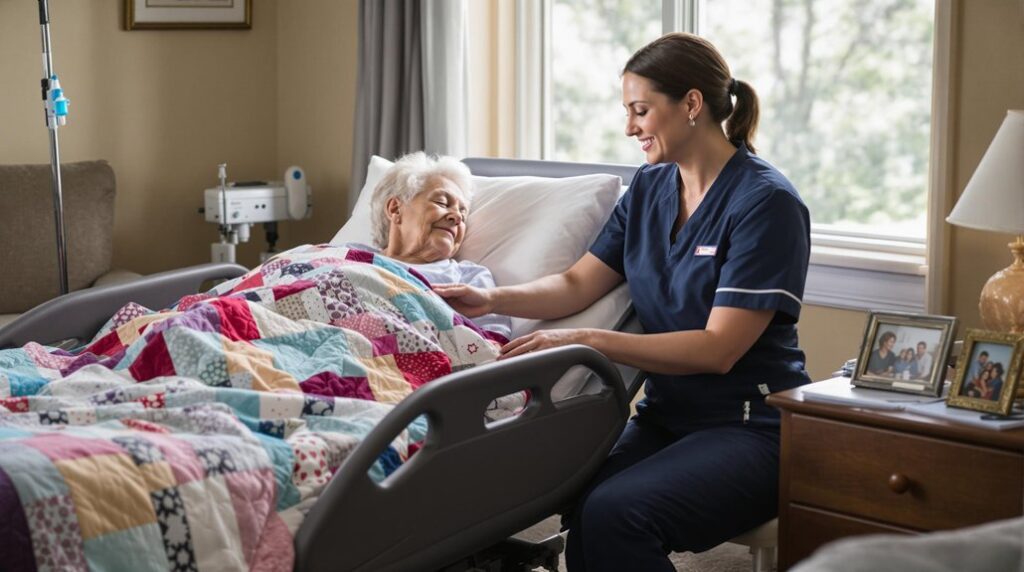While hospice provides essential medical support and care coordination, they don’t typically offer continuous in-home caregivers. You’ll receive scheduled visits from nurses, social workers, and other team members who help with medical needs, emotional support, and family caregiver training. Medicare covers most hospice services but doesn’t include round-the-clock caregiving. Understanding your complete care options will help you create the right support plan for your loved one’s needs.
Understanding Basic Hospice Services
When patients receive a terminal diagnosis, hospice care becomes a vital support system that provides comfort and dignity during their final months of life.
As a key part of the hospice service overview, you’ll find that care teams include nurses, social workers, chaplains, and trained volunteers who work together to support both patients and their families.
You’ll receive guidance from medical professionals who specialize in pain management and symptom control.
Additionally, hospice provides emotional counseling, spiritual support, and caregiver training programs to help you care for your loved one.
These programs teach essential skills like medication management, personal care techniques, and recognizing signs of distress.
The hospice team will develop a personalized care plan that addresses your family’s specific needs while ensuring your loved one maintains the highest possible quality of life.
Round-the-clock care is provided by dedicated hospice caregivers and nurses to address end-of-life challenges.
The Role of Hospice Care Teams
A well-coordinated hospice care team operates like a symphony, with each member playing an essential role in providing thorough end-of-life care.
You’ll find that hospice team dynamics revolve around a core group of professionals, including nurses, social workers, chaplains, and medical directors, who work together to address your loved one’s physical, emotional, and spiritual needs.
These specialists collaborate closely with family caregivers, offering essential caregiver training and ongoing support.
You’ll receive guidance on medication management, personal care techniques, and recognizing important changes in your loved one’s condition.
The team meets regularly to evaluate care plans, adjust strategies, and guarantee you’re getting the support you need.
Regular team evaluations ensure your care plan stays current and effective, adapting to meet evolving needs throughout the hospice journey.
They’re also available 24/7 to answer questions and provide emergency assistance, giving you peace of mind throughout the caregiving journey.
The comprehensive services include grief counseling services to help families cope with emotional distress during this sensitive time.
Types of In-Home Support Available
In-home hospice support comes in several forms to match your family’s specific needs.
You’ll find skilled in-home nursing care for medical assistance, medication management, and monitoring your loved one’s condition. Personal care aides help with daily activities like bathing, dressing, and light housekeeping.
When you need a break from caregiving duties, respite care provides temporary relief through qualified professionals who step in to maintain your loved one’s care routine.
Social workers and counselors visit to offer emotional support and help navigate end-of-life decisions. Chaplains or spiritual counselors are available to address faith-based needs and provide comfort.
Physical, occupational, and speech therapists can also visit to help maintain your loved one’s quality of life and functional abilities as long as possible.
Professional caregivers ensure proper pain management and comfort through carefully monitored medication administration and relaxation techniques.
Medicare Coverage and Caregiving Limits
Medicare covers most hospice services for eligible patients, though certain restrictions apply to caregiving hours and types of support. You’ll need to understand Medicare benefits and caregiving restrictions to make informed decisions about supplemental care.
While Medicare provides essential hospice services, it typically doesn’t cover round-the-clock caregiving.
Medicare’s hospice coverage offers vital services but falls short of providing comprehensive 24/7 caregiving support.
- Medicare benefits include intermittent nursing visits, medical social services, and limited personal care assistance.
- Caregiving is usually limited to specific tasks and scheduled visits rather than continuous care.
- You may need to coordinate additional private caregiving services to fill gaps in coverage.
- Medicare requires a doctor’s certification that life expectancy is 6 months or less, with periodic recertification needed.
Understanding these limitations helps you plan effectively and guarantee your loved one receives thorough care through combined Medicare and private support services.
Considering Medicaid home health care can provide a cost-effective alternative for families needing additional caregiving support beyond Medicare’s coverage limits.
Coordinating Family and Hospice Care
When family members and hospice caregivers work together effectively, they create a stronger support system for the patient.
You’ll need to establish clear communication strategies from the start, including regular meetings and updates about your loved one’s care plan.
Understanding family dynamics is essential for successful coordination. You can designate a primary family contact person to streamline information sharing with the hospice team.
It’s also helpful to create a shared calendar for scheduling care shifts, medical appointments, and medication times.
Don’t hesitate to discuss role expectations with your hospice provider. They can guide you in dividing caregiving responsibilities and help you understand when to step in or step back.
Working with licensed home nurses who conduct regular health assessments can help identify potential issues early and ensure optimal care outcomes.
Additional Caregiving Options to Consider
Beyond standard hospice care, you’ll find several complementary caregiving arrangements that can enhance your loved one’s support system.
When exploring alternative support options, consider both private and community-based caregiver resources to create a thorough care plan that meets your family’s unique needs.
- Private duty caregivers who can provide additional hands-on assistance during hours when hospice staff isn’t present
- Adult day care centers that offer supervised care and social interaction in a safe environment while you take necessary breaks
- Respite care services through local facilities that provide temporary relief when you need extended time away
- Volunteer organizations specifically trained to support hospice patients and their families with companionship and practical assistance
Consider discussing these options with your hospice team to determine which combinations work best for your situation.
Making the Right Care Decisions
Selecting the right care arrangements for your loved one requires careful consideration of multiple factors that impact their quality of life. In your caregiver selection process, evaluate the level of medical attention needed, the desired schedule of care, and your family’s ability to participate in caregiving duties.
Consider how different care options align with your loved one’s wishes and values. Family involvement plays an essential role in determining the right balance between professional assistance and personal care.
You’ll want to assess your family members’ availability, capabilities, and emotional capacity to provide support.
Take time to discuss options with hospice representatives who can guide you through available services and help you create a care plan that meets both your loved one’s needs and your family’s circumstances.
Planning for Long-Term Care Needs
As your loved one’s health needs evolve, planning for long-term hospice care requires a proactive approach to guarantee consistent, high-quality support.
You’ll need to assess various aspects of care preferences and create a thorough strategy that adapts to changing circumstances. Long-term planning helps guarantee your family member receives appropriate care while respecting their wishes.
Thoughtful advance planning ensures your loved one’s care evolves with their needs while honoring their personal choices and dignity.
- Document your loved one’s specific care preferences, including medical treatments, daily routines, and comfort measures.
- Evaluate financial resources and insurance coverage to understand available care options.
- Create a schedule for family caregivers and identify when professional support is needed.
- Establish clear communication channels between family members, medical teams, and hospice providers.
Reflect on working with a hospice care coordinator who can help you navigate these decisions and adjust the care plan as needed.
Conclusion
While hospice provides valuable medical support, they don’t typically offer around-the-clock caregivers. Think of hospice as your medical support team – they visit regularly to check on your loved one, manage medications, and teach your family important care skills. But for daily personal care like bathing, dressing, and meal preparation, you’ll need additional help.
Just like pieces of a puzzle, different care services can fit together to create the perfect support system for your family. Whether it’s hiring private caregivers or working with home health agencies, you have options to build a care team that feels right for you.
Remember, you’re not walking this path alone. Many families blend hospice care with other services to create a warm, supportive environment where their loved ones can feel comfortable and cared for at home. Focus Family Care understands these challenges and can help you put all the pieces together.
If you or a loved one need help, don’t wait. Reach out to Focus Family Care today at (561) 693-1311 or email us at info@focusfamilycare.com.





